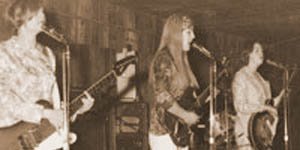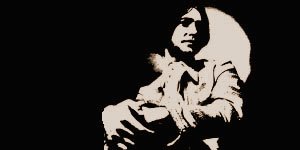The Beat Goes On, Part XI.
Okay, so wow, that was more like a long weekend than a day off. But we’re (or at least I’m) back, and starting from Number One Hundred we go:
100. Funkadelic “I’ll Bet You”
(Sidney Barnes/George Clinton/Patrick Lindsey)
1969
Available on Funkadelic [Bonus Tracks]
No, it doesn’t sound like prime Funkadelic, or at least it doesn’t sound like mature Funkadelic, ’cause it’s prime as prime can be. Eddie Hazel’s guitar is stinging and floating weightlessly around the call-response vocals, Bootsy’s bass is slippery and wet, and the drums echo mightily (surely someone’s used the opening beats as a sample). Some post-psychedelic reverb starts to soak in about halfway through, and it grows gradually more spacey and uncategorizable (though still under the general heading of Black Music). But the lyrics are more Holland/Dozier/Holland than Clintonian at this point. If you’ve never heard Funkadelic, or never been able to get into them, this may be the perfect entry point, especially for rock and soul fans.
099. The Jimi Hendrix Experience “Fire”
(Jimi Hendrix)
1967
Available on Are You Experienced?
This is a Stax song. No, seriously, only with overcharged guitar in place of horns and the drums and bass turned up to eleven. But it’s funky, and has that hurry-up-get-to-the-chorus drive that only the truly deep-soul (Joe Tex, Edwin Starr, Clarence Carter on a good day) could get out of the Memphis charts. And, of course, it’s got Jimi’s black-boho persona all over it, not at his most lascivious (that’d be “Foxey Lady”), but at his most good-time. Too many people focus on the template he provided for hard rock, and not enough on the way he built on earlier jumping, jiving, and wailing forms. This song really belongs, not in a the fleshy hippie Woodstock mud, but in a chicken shack on a Saturday night, with Studebakers and Cadillacs parked outside, and some girls whose fire would be worth standing next to on the floor.
098. The Left Banke “Pretty Ballerina”
(Michael Brown)
1967
Available on There’s Gonna Be a Storm: The Complete Recordings
Twee alert! From the circular, music-box piano line to the mountain-stream-cool falsetto that Spanish-born vocalist Steve Martin breaks into at the end of every verse, to the inevitable chamber-quartet middle eight, this song, even more than “Walk Away Renee,” established the prototypical sound of chamber-pop, still religiously followed in the late 90s by artists like Elliott Smith and Belle & Sebastian. Equal parts mod, Mozart, and mope, the Left Banke are one of the only (I’m tempted to say the only, if it weren’t for Brian Wilson) self-contained American bands that could challenge the most recklessly music-history-pillaging groups of the British Invasion on their own turf. Shame about Renee.
097. Jimmy Cliff “Many Rivers to Cross”
(Jimmy Cliff)
1969
Available on The Harder They Come
This choice, coming right (okay, fairly soon) after the Melodians’ “Rivers of Babylon,” makes me sound like one of those people whose only reggae record they own is the Harder They Come soundtrack. Actually, I don’t own it, and only I only found out through allmusic.com that both songs were on the same album. Damn you, anonymous soundtrack album compiler with impeccable taste! Also, I could have sworn it was a cover of an American or British (gospel) song, but no, apparently Cliff wrote it. It must have been covers that I’ve heard. None of them have the transcendantly soulful quality that this original, church-organ-drenched one does. Jimmy Cliff would later be known for pandering reggae-pop to the white masses, but here he kicks white music’s ass.
096. The Luv’d Ones “Up Down Sue”
(Char Vinnedge)
1966
Available on One Kiss Can Lead to Another: Girl Group Sounds, Lost and Found
Apparently Blondie had predecessors; and I’m not talking cute, pop “The Tide Is High” or “Heart of Glass” Blondie, either, I’m talking tough, raunchy “Rip Her to Shreds” or “One Way or Another” Blondie. Char Vinnedge’s voice even sounds like a young Debbie Harry’s. But there’s no way Chris Stein would ever have recorded such ear-bleeding guitar sludge behind his girlfriend; this was 1966, in Detroit, and these girls — girls! — were using plodding droney feedback before anyone had ever heard of the Velvet Underground or the Stooges. Of course, no one ever heard of them, either, so male-centric rock & roll mythology was safely preserved. The song’s another one of those “that girl’s a bitch” songs, except with surprising interest in the welfare of the bitch in question.
095. Sam Cooke “(Ain’t That) Good News”
(Sam Cooke)
1964
Available on Ain’t That Good News
Yes, that is a banjo. And so the greatest black singer of the original rock & roll era brings American music full circle. (Of course you know that the banjo was originally an exclusively black instrument, developed by slaves to mimic the stringed instruments of West Africa, and only became associated with country music because of country’s roots in explicitly racist minstrelsy.) The song, though, is uplifting and glorious; there’s a gleam in Cooke’s eye and a quickening in his step as he’s rushing to meet his baby at the station (even the subject matter is old-fashioned; it could have been a minstrel song, if it weren’t so damn happy). When he shouts happily that he’s going to “disconnect! my telephone,” you can’t help but grin. The man deserves it.
094. Dave Davies “Death of a Clown”
(Dave Davies)
1966
Available on Something Else By the Kinks
Cheating? Why, no; Dave released this as a single under his own name, and it’s only because it later came out on a Kinks album that people think of it as a Kinks track. But Brother Ray wasn’t the only lyricist in the group, and while the verses may owe more than a little to Dylan’s surreal image-heavy electric phase, the beery singalong of the chorus is nothing but Daviesian. Far as I can tell, it’s about a circus mourning the death of its star, and the music oom-pahs and jogs along most appropriately for a carny wake. Ray may get all the critical oohs and ahs, but Dave deserves better than just inventing distortion.
093. Amon Düül II “Kanaan”
(Chris Karrer/Dieter Serfas/John Weinzeirl)
1969
Available on Phallus Dei
I have no idea how many times I’ve listened to this song, but I swear that every time it comes up I go, “wait, how did 80s indie get in here?” Dinosaur Jr., Sebadoh, the Pixies, and bits of Sonic Youth were anticipated by the original (by record-release dates, anyway) Krautrock band; not to mention, of course, thousands of others. It doesn’t have Can’s tribal-sexual build-release formal structure, or Faust’s synthesizer innovation, or Tangerine Dream’s eerie atmospherica, or Kraftwerk’s soulless robot jive, but it does sound like nothing else released during the 1960s. Dark, foreboding (so, basically just German, then) and a little bit wanky, it’s so formless and unmelodic that it could have been recorded yesterday. Yes, that’s high praise.
092. Tim Buckley “The River”
(Tim Buckley)
1969
Available on Blue Afternoon
Van Morrison learned all his mystic jazz-shaman tricks here. Buckley’s voice isn’t as immediately captivating as Morrison’s (or as that of his own punk kid’s), but it’s a richer, more versatile instrument, and he’s a better (at this point) writer than Morrison, throwing out vast curlicues of metaphor and image that only Dylan, Joni Mitchell and Neil Young were managing at this level. It’s a difficult trick to pull, bringing the ordinary natural world of grass and water into cosmic proportions, especially when the only tools you’re using are those available in your average nightclub, but his shifting, wily, smoke-like voice can pull almost any trick in the book. He was just starting to head for the outer reaches of accessibility here; but this is a song both a grandmother and a teenage punk could love.
091. Thunderclap Newman “Something in the Air”
(John “Speedy” Keen)
1969
Available on Hollywood Dream
This is the kind of song that everyone has heard but no one really listens to, which is a shame, because when you do listen to it, you go, “why is there a post-bop ragtime piano solo in the middle of all this soft-rock pomposity?” The answer is that Thunderclap Newman was a Pete Townshend protégé band, so you could hardly expect them to be normal. From the helium vocals to the off-kilter handclap rhythm section to the, yes, the piano solo played by a fellow who looked like some sort of CPA, it’s an odd song. Catchy, yes, and even possibly Zeitgeist-capturing (for an intense experience, seek out Labelle’s 1971 version, which combines it with “The Revolution Will Not Be Televised” and peels paint from walls), but still a distinctly odd duck. They only did the one (very good provincial-psychedelic) album, and teenage guitarist Jimmy McCulloch ended up in Wings. There were no post-bop ragtime piano solos to break up that soft-rock pomposity.
Next: 090-081. >>

No comments:
Post a Comment